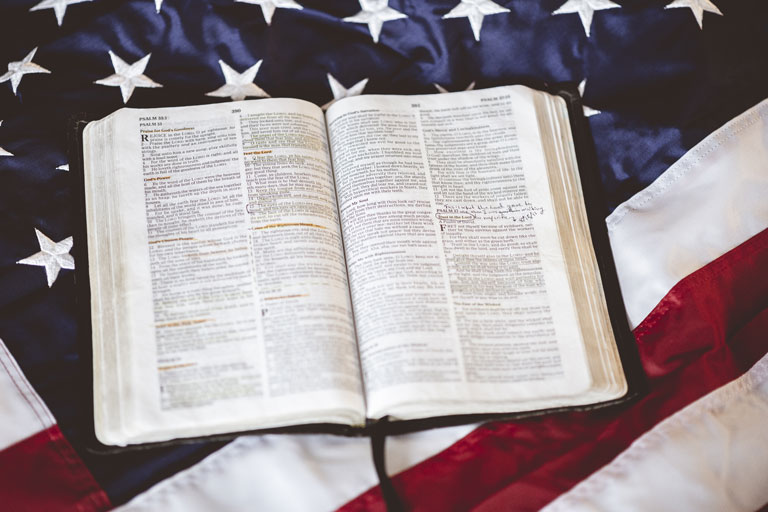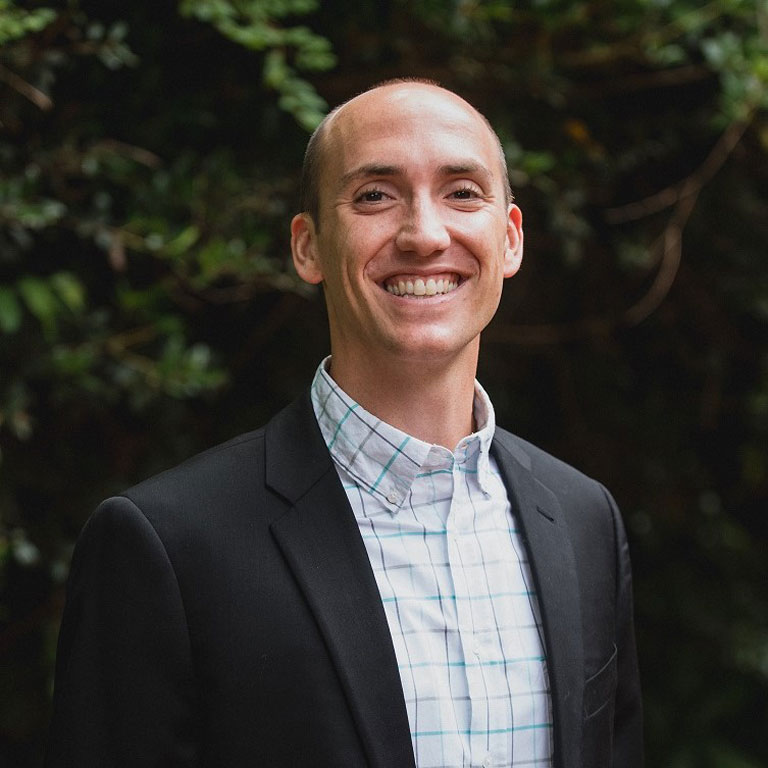IUPUI sociologist Andrew Whitehead often finds that his research studying Christian nationalism intersects with major events happening across the country. His expertise and unique point of view have been even more important as the events of the last year have unfolded.
From the COVID-19 pandemic to the January 6 insurrection at the United States Capitol, Whitehead has seen Christian nationalism – an idea that many Americans hold that the United States should be distinctively Christian in its national identity, public policy and sacred symbols – play a role, and he has been hard at work shedding light on how that belief influences social life in the U.S.
Whitehead and Sam Perry of the University of Oklahoma have been studying Christian nationalism for several years, culminating in their new book Taking America Back for God: Christian Nationalism in the United States, published in 2020 with Oxford University Press. It provides the first large-scale empirical understanding of how widely-held the belief is that the U.S. is a Christian nation.
“Before embarking on this research, we did not know how many Americans believed this, and we did not have a good understanding of how important this framework is in terms of understanding things like political issues or how people view family life,” said Whitehead, an associate professor in the IU School of Liberal Arts at IUPUI and co-director of the Association of Religion Data Archives. “Our work has been integral to showing the importance of this empirically, and it has not been done before.”
The research shows that over half of Americans associate with Christian nationalism in some way – with about 20 percent of Americans strongly embracing Christian nationalism and believing Christianity should be privileged among other groups, and 32 percent of Americans embracing the idea of a Christian nation but not as wholeheartedly, remaining somewhat skeptical that Christianity alone should be privileged.
While the term “Christian nationalism” may have entered many Americans’ vocabularies in recent years, Whitehead said it is not a new concept.
“The idea of a Christian nation, or using Christianity to make an American identity, was with us even before the start of the United States – the first colonists used the idea to make a new identity,” Whitehead said. “We see this pop up in history during times of major upheaval, such as the Revolutionary War, after George Washington’s presidency ended, in the 1950s when ‘In God We Trust’ became the nation’s motto, and during the cultural upheaval of the 1960s.”
We can add the events of the last year to that list.
Americans will never forget the images of rioters overtaking the U.S. Capitol on January 6 in an effort to overturn the results of the presidential election. Whitehead said there were many important elements factoring into the insurrection, and while Christian nationalism is not the only explanation, it is a vital one.
“In the United States, everyone has a right to vote and have a say, but Christian nationalists see that as a threat,” Whitehead said. “Christian nationalism looks towards a very specific desire for the country, and it is achieved through power and privilege. With President Trump saying he was the only one who can save the country and God wanted him to win, and with the questioning of election results, it all came together with this attack on our country.”
Whitehead said while it was shocking for many to see Christian symbols and flags at the insurrection, it was not surprising to those who study Christian nationalism. People who embrace the idea would have seen President Trump’s loss as a threat to democracy and overturning an election would have been a necessary measure.
Following the insurrection, Whitehead and Perry have been busy explaining Christian nationalism and helping people understand its prevalence. They are working with many leaders of denominations across the country who have broad influence within white evangelicalism or white Christianity, helping to show them what Christian nationalism is, why it matters and the threat it holds to American democracy.
“Many people outside the Christian faith are saying, ‘If this is Christianity, I want no part in it,’” Whitehead said. “But our research shows that Christianity isn’t the same as Christian nationalism. And for many Christian leaders who have reached out to us, they see this embracing of violence and conspiracy theories as a threat to Christianity here in the United States and around the world.”
Another threat we all currently face is the COVID-19 pandemic. Whitehead said his research over the last year shows that Christian nationalism is closely associated with lack of protective behaviors people take, such as the refusal to wear masks or avoid large events. His research also showed that Christian nationalists were more likely to question scientific authorities during this time.
“Christian nationalism plays a role in prolonging the pandemic, both in terms of personal behavior and how we, as a society, should respond,” Whitehead said. “When we talk about COVID-19 and vaccines being politicized, or this being a cultural war issue with Christian nationalism at the center of it, it really is costing lives and a lot of money and support from the government.”
Whitehead and Perry have found that Americans who embrace Christian nationalism are more likely to believe the government should prioritize the economy and individual liberties, rather than protecting the vulnerable from the pandemic. Whitehead said they are also more likely to refer to the virus by racially insensitive terms and may overlook the disproportionate suffering in minority communities.
Their research also shows that Christian nationalism is more closely tied with anti-vaccination attitudes. Whitehead said those who strongly embrace Christian nationalism are more likely to be skeptical of the vaccine and not take it – something he says could impact the country’s ability to reach herd immunity.
Through the events of the last year, Whitehead has been able to help others better understand Christian nationalism and its implications for our country and world. And for Whitehead, these experiences have helped him gain a better understanding of how religion shapes and is shaped by contemporary American culture, a major focus of his work.



